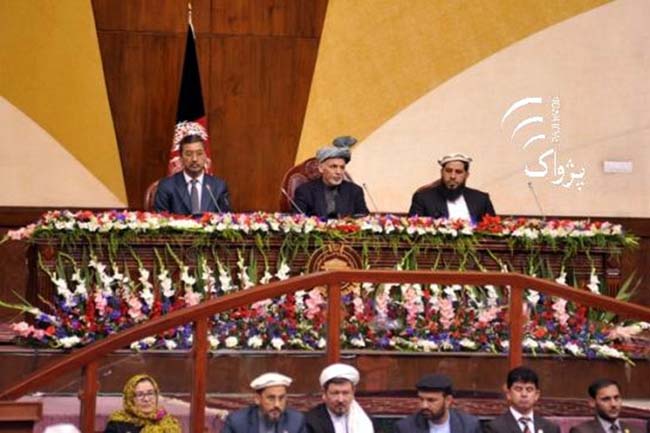President Ashraf Ghani’s much-publicized speech in the joint session of the parliament on Monday was convincing enough for many who expected announcement of a change in policy of the government in the struggle against the Taliban and other militant groups. However, his apparent attempt to classify the Taliban into two groups of murderers and reconcilable left the room for hesitation by some who doubt the government have enough determination to suppress the Taliban. In his speech, President Ghani said he would no more wait for the Taliban to come to the table of negotiations, rather Afghan National Security Forces (ANSF) would take on the militant groups like the Islamic State, Al-Qaeda, Haqqani Network and the Taliban directly. Ghani stressed that the government would use all means to fight the militant groups and will be bound by implementing Afghan courts’ rules on convicted militants including executing death punishments. He also challenged Pakistan by saying that the country should fulfill its commitment and take military action against the leadership of the Taliban on the Pakistani soil.
As expected, President Ghani’s speech signaled the toughening of Afghan government’s approach on fighting the Taliban – at least for an unspecified period until another round of peace efforts – and other militant groups. But it was not any sort of change in previously-established government stance against the Taliban and on the issues of peace talks and relations with Pakistan, who is a key facilitator of peace talks with the Taliban. The toughening of stance was more seen in change of tone and promises of intensification of the campaign against the militant groups. He called on Pakistan’s cooperation and reiterated on his previous position on negotiating with those Taliban who are willing to come to table of negotiations. In fact, all what he wanted to reveal was a temporary pause in the peace talks with the Taliban until a militarily weakened Taliban is back to the table. But it should again be noted that the Taliban were the first to reject the peace initiative.
However, for many this change of tone was too much on the side of the Afghan government that for a long time insisted on courting the Taliban for peace talks and avoided a robust military campaign against the militant group. Former President Hamid Karzai’s government released hundreds of Taliban prisoners to appease the Taliban leadership, something that did not help the peace efforts. Many argue that the mass release of Taliban prisoners as well as release of some key members of the group was catastrophic for the efforts to stabilize the country as most of the released militants showed up on the battlefields against government forces and some even carried out attacks on government targets. President Ghani referred to this policy of the former administration, saying that there would no arbitrary release of Taliban prisoners from Afghanistan’s prisons.
President Ghani himself carved the term ‘political opponents’ for the Taliban with the aim to cleanse the Taliban and pave the way for bringing the group into the mainstream politics. However, he went slightly further in shifting from this definition in his speech to the parliamentary session by saying that “some of the Taliban” are murderers and the government would not seek peace talks with them. This classification is again aimed at redefining the terms insurgents and terrorists and the Taliban and other home-grown militant groups into enemy and reconcilable groups. In fact, President Ghani went a step further in establishing the term ‘political opponents’ by suggesting that some of the Taliban are different from the ‘murderer’ Taliban who wage war against Afghans and refuse to come to peace talks.
In the process of establishing the ground for future peace talks, it is very apparent that President Ghani is trying to demonize the foreign-rooted militant groups like Al-Qaeda, Haqqani Network and the Islamic State along with irreconcilable part of the Taliban that may split in the future from the other part of group who may come to the table of talks and negotiate a peace deal and some sorts of power-sharing with the rest of the Afghan political groups. If one maintains logical views on the Afghan government’s peace efforts, the demonization of foreign-rooted militant groups and the hardliner segments of the Taliban is a prerequisite for future peace talks with the reconcilable parts of the Taliban and other Afghan militant groups, and the Afghan government is just doing what is needed before a potential peace process.
The whole thing about Ashraf Ghani’s speech to the parliamentary session was about rallying the Afghan political class and the lawmakers behind the Afghan National Security Forces (ANSF) and the government’s military efforts against the Taliban. At a time when there are widespread skepticisms about the government’s policies and the performance of the ANSF, the president tried to assure of strength of ANSF in the fight against the Taliban and that the government would do more to get international support to strengthen Afghan security and defense forces. Ghani’s attendance in the extraordinary session of the parliament with no doubt would help rally support from the politicians and the public behind the security forces in the fight against the militant groups.
Home » Opinion » Ghani’s Parliament Address
Ghani’s Parliament Address
| Abdul Ahad Bahrami

